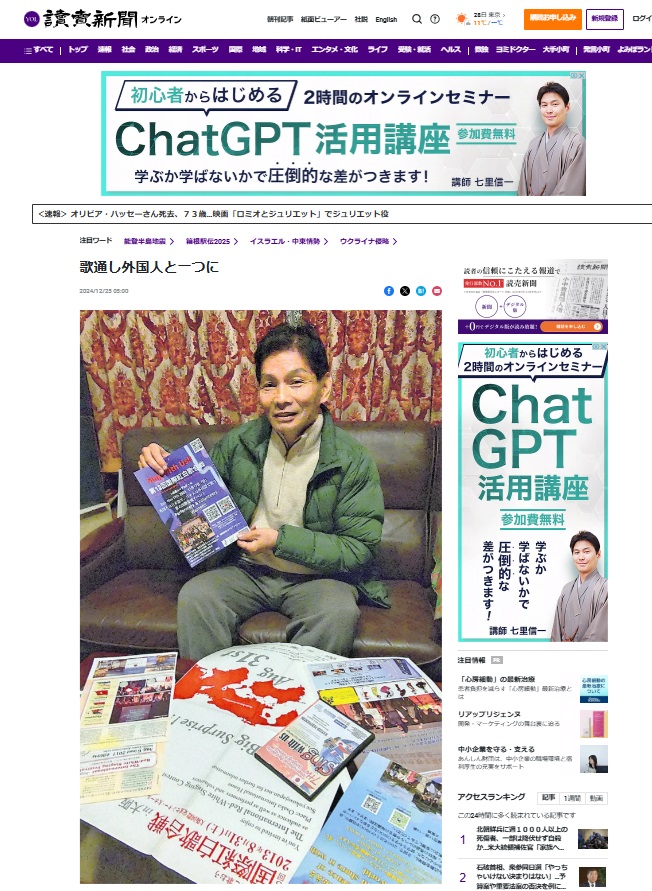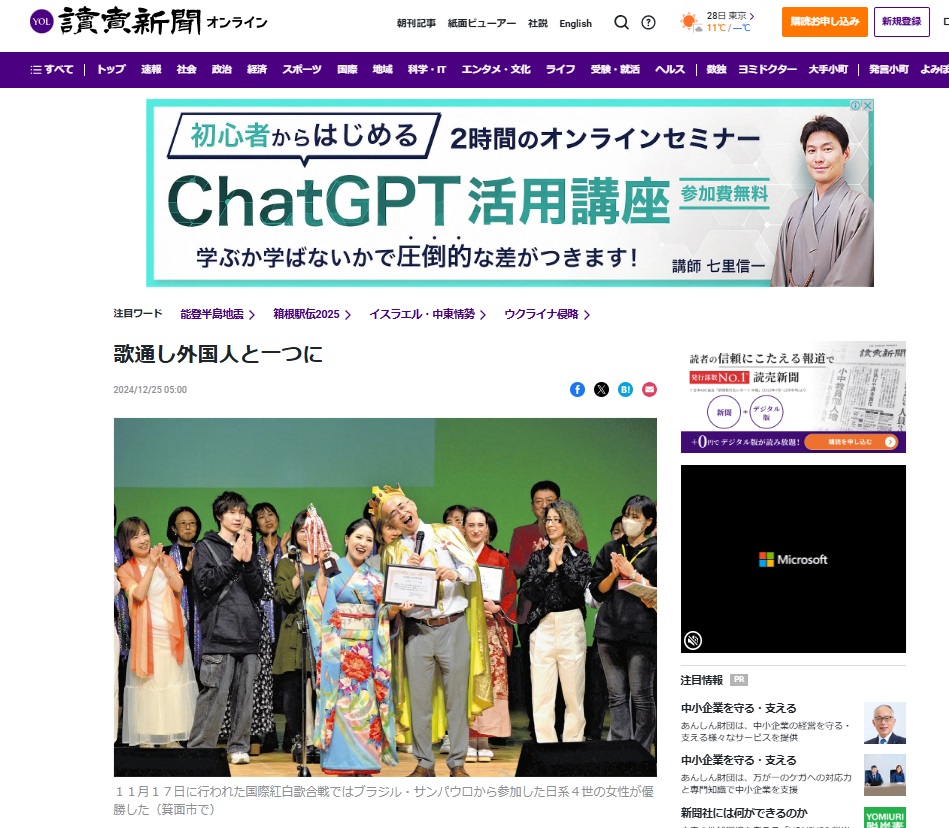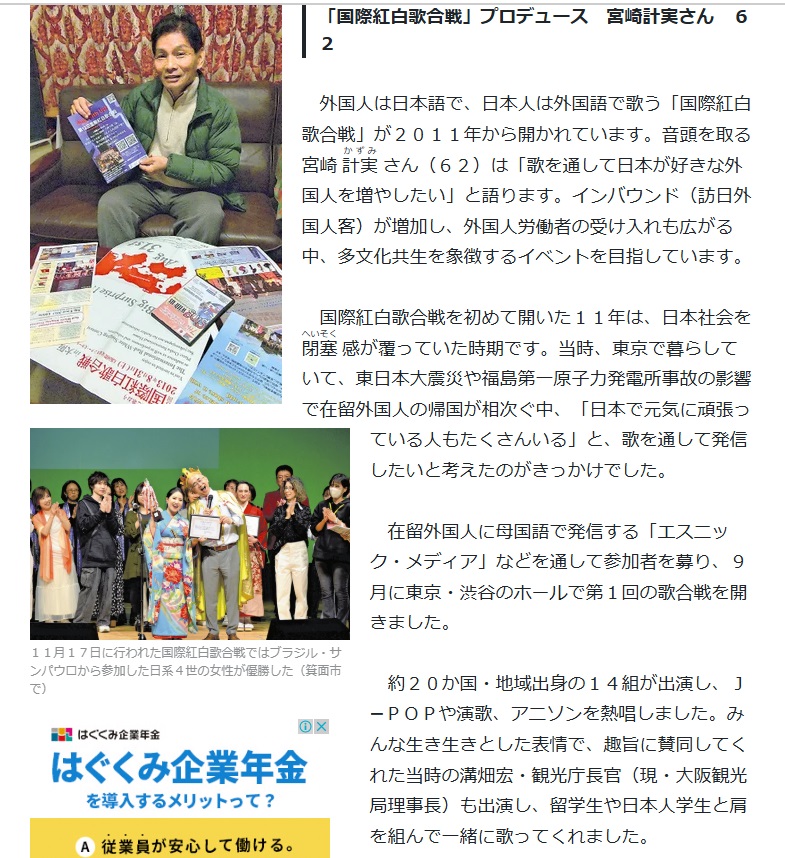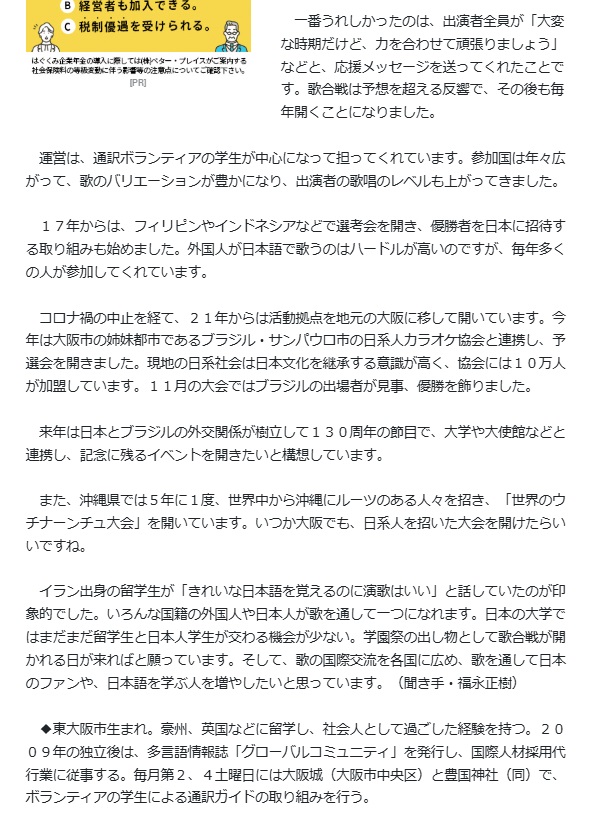International Red and White Singing Festival" Yomiuri Shimbun article
- 2024/12/28 14:45

English translation of the Yomiuri Shimbun article published on December 25:
"International Red and White Singing Festival" Producer Kazumi Miyazaki, 62

Since 2011, the "International Red and White Singing Festival(IRWS)" has been held, where foreigners sing in Japanese and Japanese sing in foreign languages. Kazumi Miyazaki (62), who spearheads the event, says, "I want to increase the number of foreigners who like Japan through songs." As inbound tourism increases and the acceptance of foreign workers expands, the event aims to symbolize multicultural coexistence.
The first IRWS was held in 2011 when Japanese society was enveloped in a sense of stagnation. Living in Tokyo at the time, as many foreign residents were returning to their home countries due to the Great East Japan Earthquake and the Fukushima Daiichi Nuclear Power Plant accident, Miyazaki wanted to convey through songs that "there are still many people doing their best in Japan.
"Participants were recruited through "ethnic media" that disseminate information to foreign residents in their native languages, and the first singing contest was held in September at a hall in Shibuya, Tokyo.
Fourteen groups from about 20 countries and regions performed, passionately singing J-POP, enka, and anime songs. Everyone had lively expressions, and Hiroshi Mizohata, then-Commissioner of the Japan Tourism Agency (current Director General of the Osaka Tourism Bureau) who supported the concept, also performed, singing together with international and Japanese students arm in arm.
The most gratifying aspect was that all performers sent encouraging messages like "It's a difficult time, but let's work together and do our best."
The singing event received an overwhelming response, leading to its annual continuation. The event is primarily run by student volunteer interpreters.
The number of participating countries has increased year by year, enriching the variety of songs and improving the singing level of performers.
Since 2017, they have also started holding selection events in countries like the Philippines and Indonesia, inviting winners to Japan. Although it's challenging for foreigners to sing in Japanese, many people participate every year.
After a hiatus due to the COVID-19 pandemic, the event has been held in Osaka, Miyazaki's hometown, since 2021. This year, they collaborated with the Japanese-Brazilian Karaoke Association in São Paulo, Brazil, a sister city of Osaka, to hold preliminary rounds.
The Japanese-Brazilian community has a strong awareness of preserving Japanese culture, with 100,000 members in the association.

In the November competition, a Brazilian participant brilliantly won first place. Next year marks the 130th anniversary of diplomatic relations between Japan and Brazil. They are planning to hold a memorable event in collaboration with universities and embassies.
In Okinawa Prefecture, the "Worldwide Uchinanchu Festival" is held every five years, inviting people with Okinawan roots from around the world. Miyazaki hopes to someday hold a similar event in Osaka, inviting people of Japanese descent.
It was impressive when an Iranian international student said, "Enka is good for learning beautiful Japanese." People of various nationalities and Japanese can unite through songs. There are still few opportunities for international and Japanese students to interact at Japanese universities. Miyazaki hopes that one day the IRWS will be held as part of school festivals. He aims to spread international exchange through songs to various countries and increase fans of Japan and people learning Japanese through music. (Interviewer: Masaki Fukunaga)
Born in Higashiosaka City, Miyazaki has studied in Australia, the UK, and other countries, and has professional experience abroad. After becoming independent in 2009, He publishes the multilingual magazine "Global Community" and is engaged in international talent recruitment agency work. Every second and fourth Saturday of the month, she organizes volunteer student interpreter guide activities at Osaka Castle and Houkoku Shrine in Osaka City's Chuo Ward.

